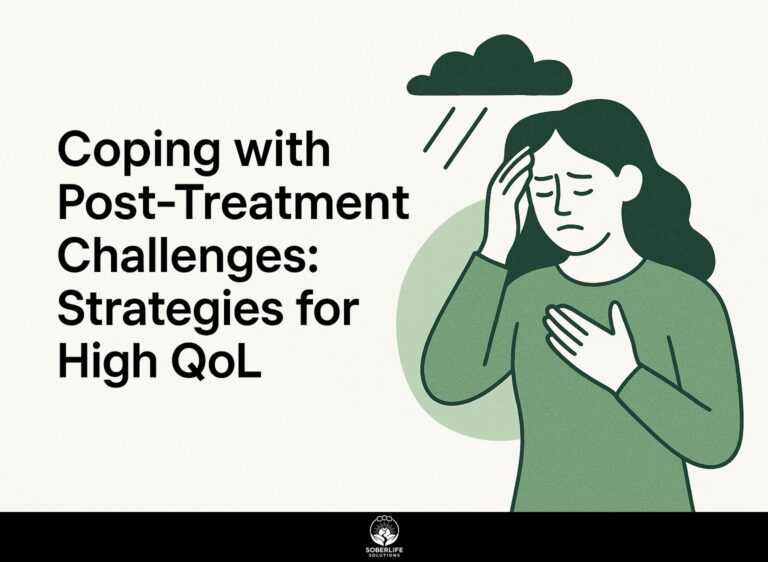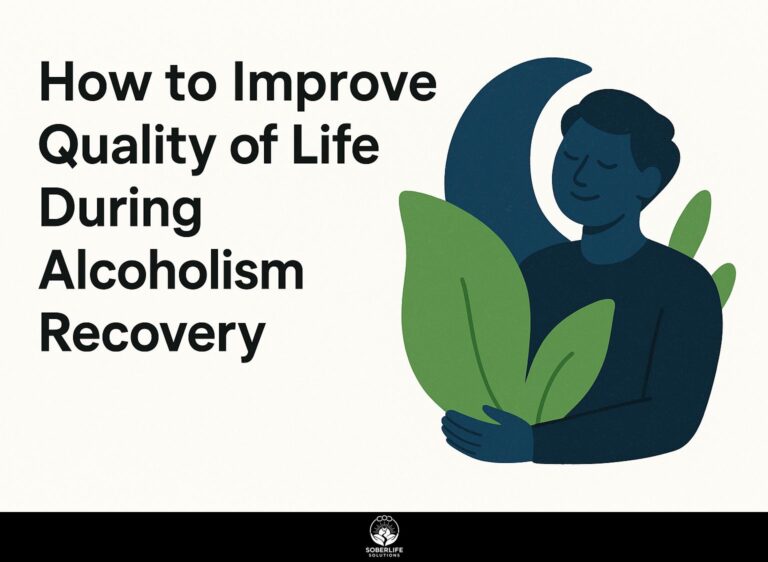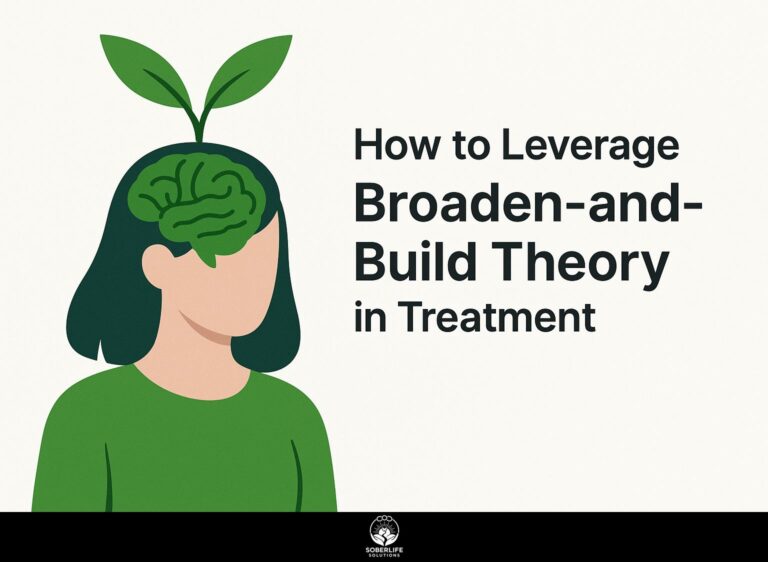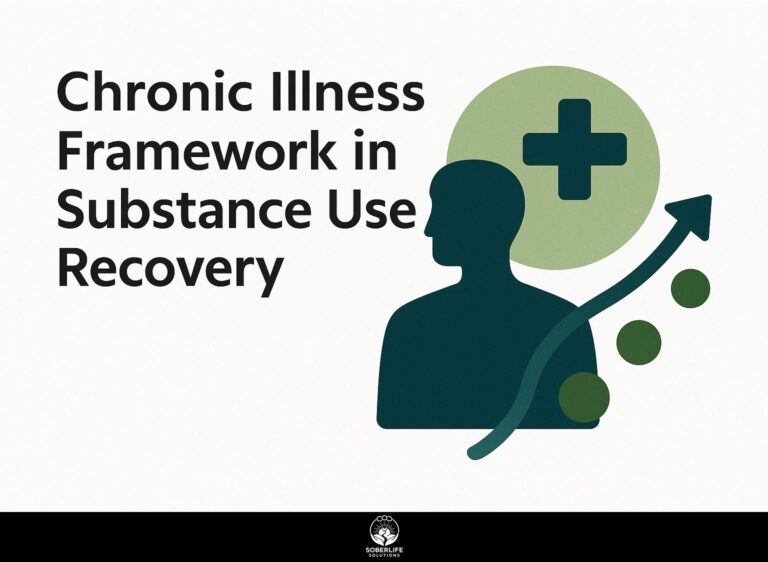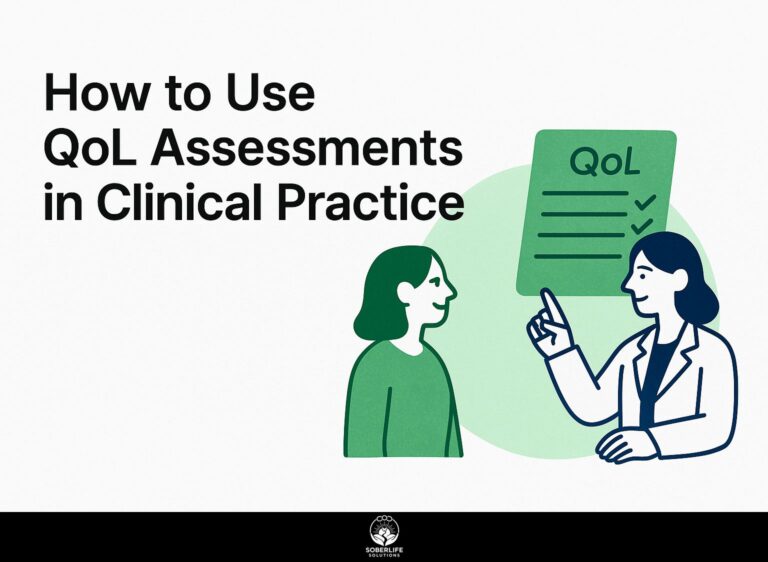How to Address Vocational Needs in Recovery
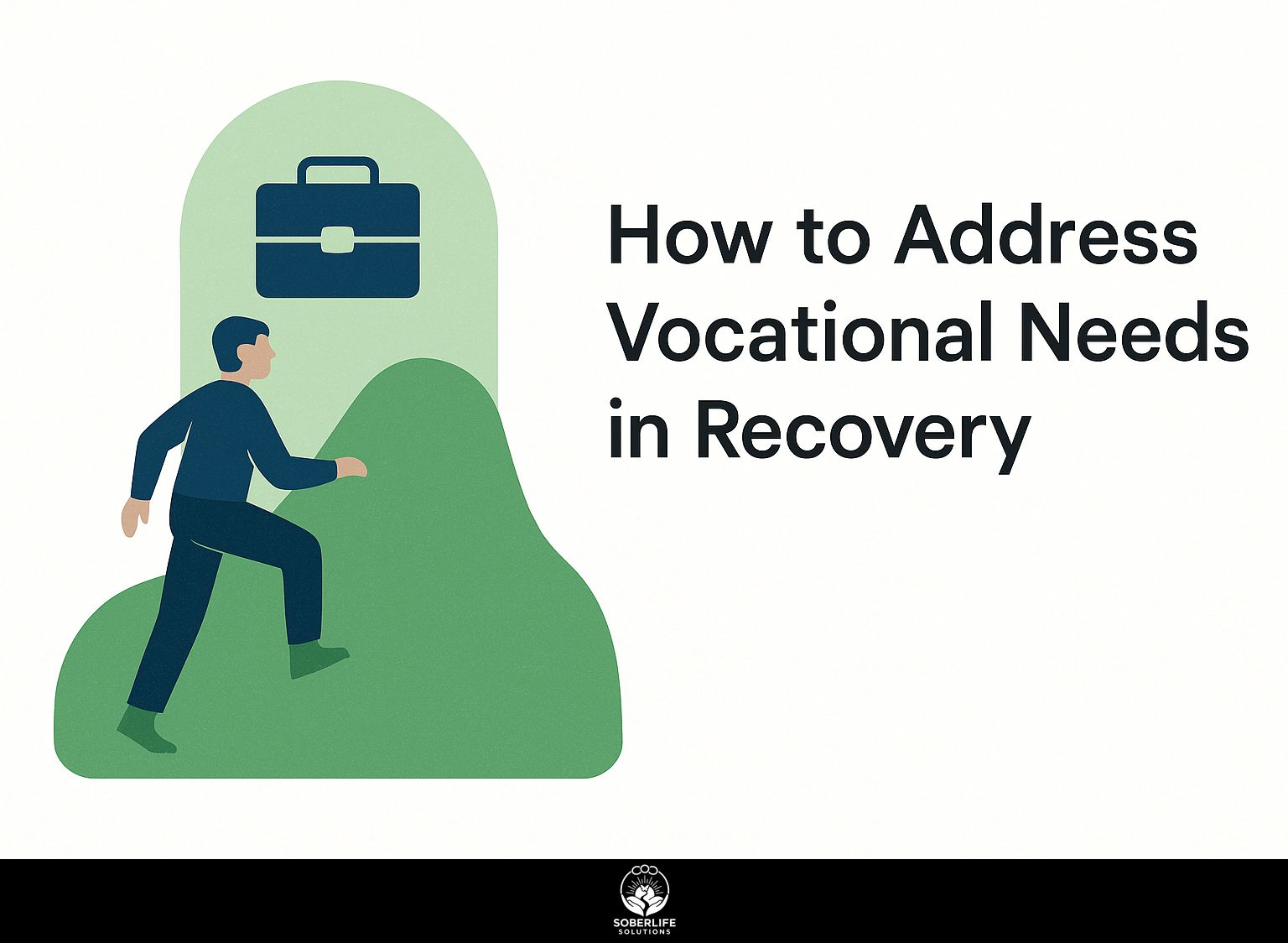
Dealing with addiction recovery is hard, particularly when focusing on job training and achieving financial security. At West Coast Recovery Centers, we understand the importance of addressing vocational needs for individuals facing substance use disorders. This article will look at ways to build skills and use methods like Individual Placement and Support to help you find steady work and recover over the long term.
Key Takeaways:
Learning About Job Needs During Recovery
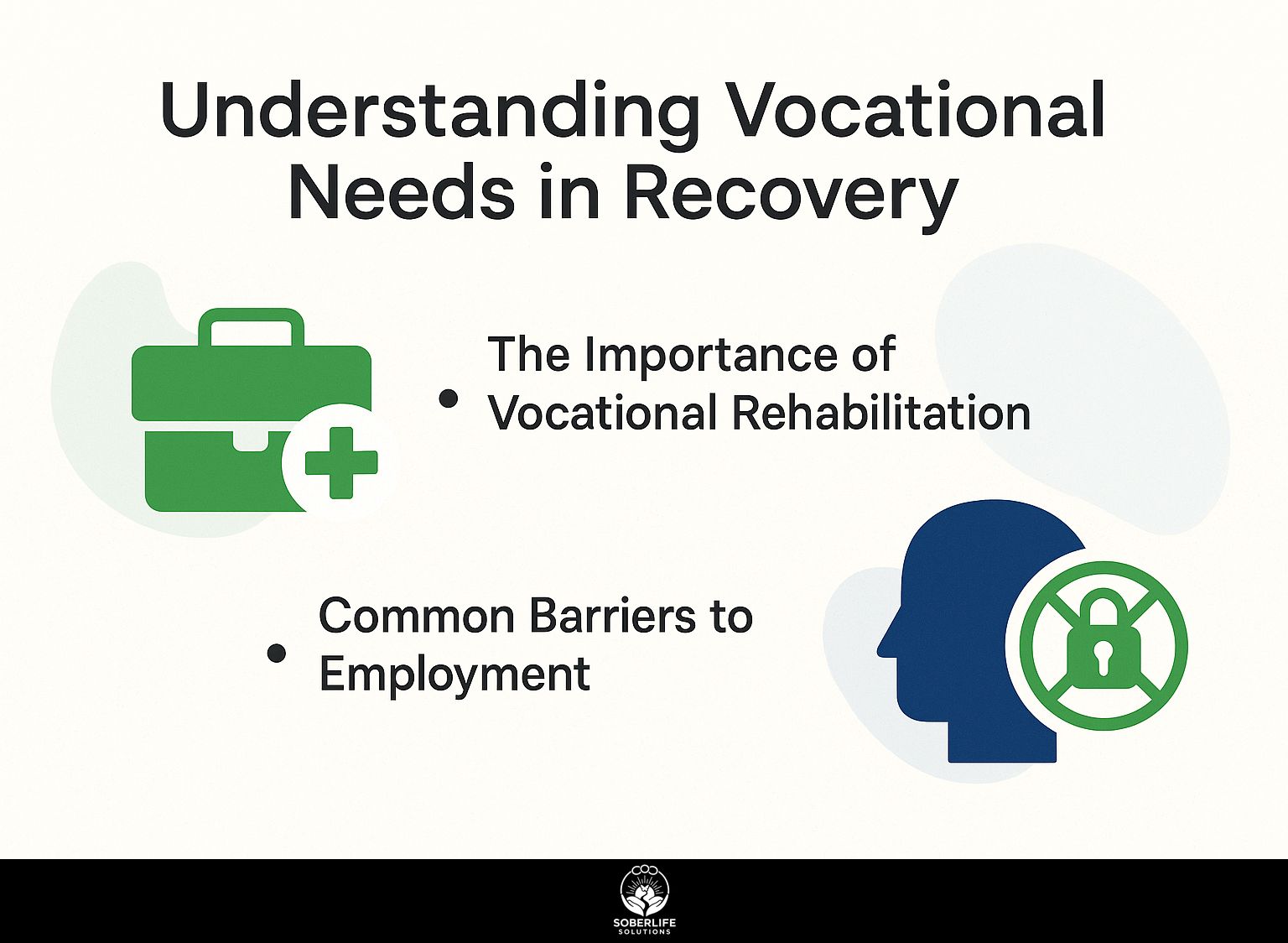
Knowing what people need for jobs during recovery is important for creating helpful programs that tackle the particular issues experienced by those with substance use problems. Successful recovery can also significantly impact mental health, helping individuals regain their sense of stability and purpose. To explore how sobriety positively affects mental well-being, you can learn more about the mental health benefits of sobriety and its role in recovery.
The Importance of Vocational Rehabilitation
Vocational rehabilitation is important for helping people become independent again. It can lower relapse rates by up to 30% when included in treatment programs.
These programs provide critical services that address both emotional and financial needs.
For instance, participants often engage in counseling to improve emotional regulation, helping them cope with workplace challenges. Programs like the Ticket to Work initiative help people find jobs, supporting financial security.
According to the Department of Education, individuals who participate in vocational rehabilitation are 27% more likely to secure employment compared to those who do not. As noted by Veterans Affairs, vocational rehabilitation services offer comprehensive support and services that further enhance job readiness and emotional well-being.
These programs help people recover and find jobs by offering emotional support and practical job training, which helps them return to society.
Common Barriers to Employment
People in recovery often struggle to find jobs due to a lack of education, criminal records, and the stigma linked to substance use disorders.
To overcome these challenges, targeted strategies can be implemented.
Community support initiatives, such as mentorship programs, provide guidance and networking opportunities. Training programs such as Job Corps or courses at local community colleges can improve your skills and qualifications.
- Organizations like local nonprofits often offer workshops focused on resume building and interview preparation.
Efforts to promote a supportive atmosphere can reduce stigma, encouraging employers to consider hiring people who are in recovery. Engaging with these resources can significantly improve job readiness. Additionally, connecting with groups that provide support, such as [Narcotics Anonymous](https://soberlifesolutions.com/narcotics-anonymous-meetings/), can be an essential part of recovery and reintegration into the workforce. For those interested in a comprehensive overview, this guide by the Department of Labor covers recruitment and employment strategies for people in recovery.
Assessment of Skills and Interests
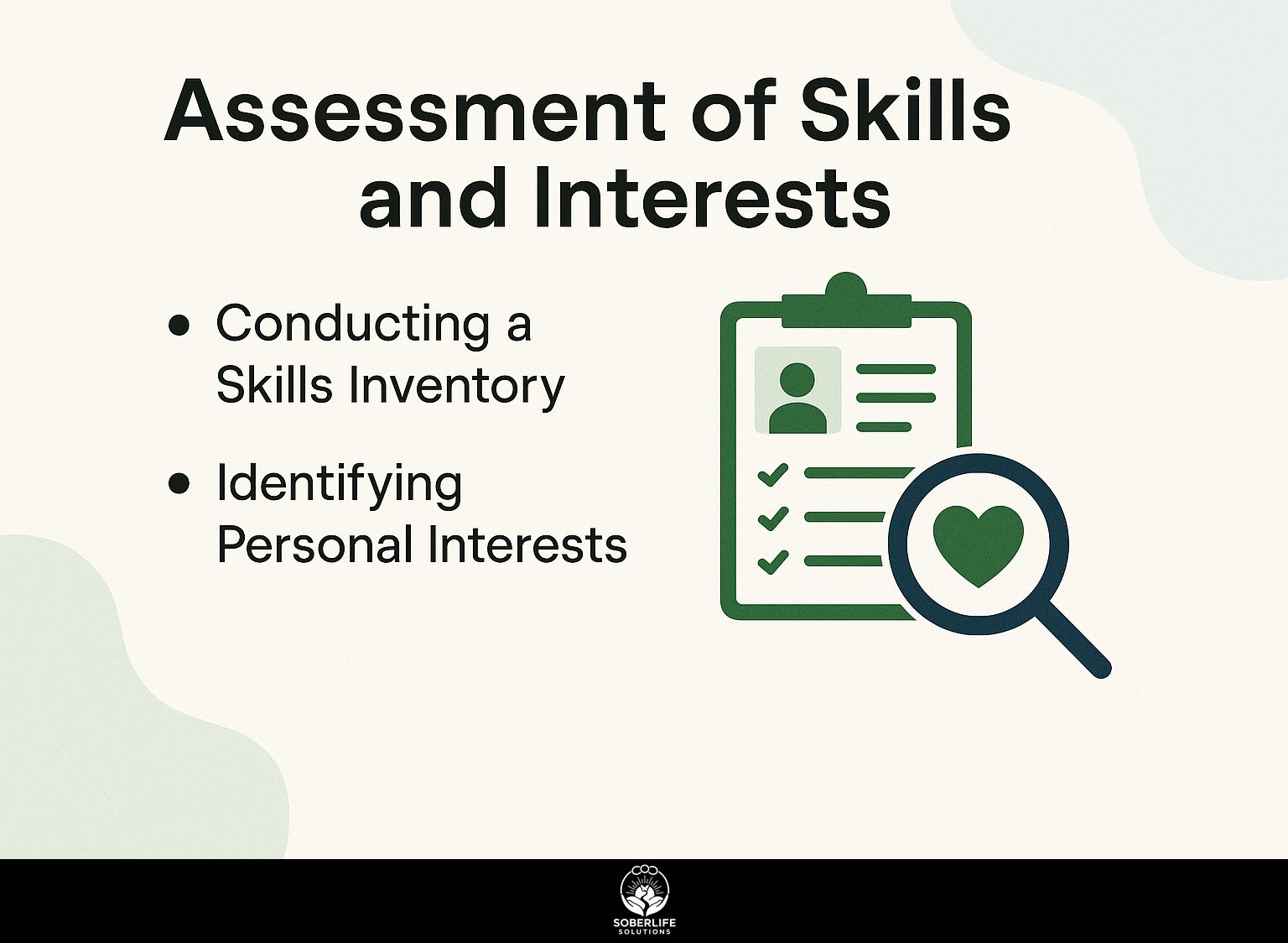
Carefully reviewing skills and interests is important for creating individual plans that align with each person’s career goals during recovery. Additionally, building a strong support network can greatly enhance this process. For those seeking effective strategies, one of our most insightful case studies demonstrates this principle with real-world results.
Conducting a Skills Inventory
A skills inventory helps find out what someone is good at and where they need improvement. This is important for successful skills training and for improving job prospects after recovery.
To create a list of your skills, begin by using assessment tools such as the Skills Profiler, which provides a thorough review of your abilities. The U.S. Department of Labor offers excellent resources for this purpose, including the O*NET Career Exploration Tools.
Next, categorize your skills into hard skills (e.g., software proficiency) and soft skills (e.g., communication).
After completing the assessment, interpret the results by identifying which skills align with your career goals. Focus on what needs to get better and look into training options like online classes or workshops.
This method shows you what actions you can take now and improves how you learn.
Identifying Personal Interests
Finding what you enjoy personally can greatly increase motivation and satisfaction in job training, resulting in more successful recovery.
Attending workshops about learning more about yourself can bring about big changes.
For example, workshops using tests like the Holland Code Career Test help people find out their interests and personality, connecting them to matching career paths.
Platforms like 16Personalities offer detailed information about personal strengths and preferences.
To maximize these tools, engage in discussions with a career coach who can facilitate interpretation and application of findings. This organized method helps make clear choices that match individual interests and abilities.
Creating a Recovery-Focused Employment Plan
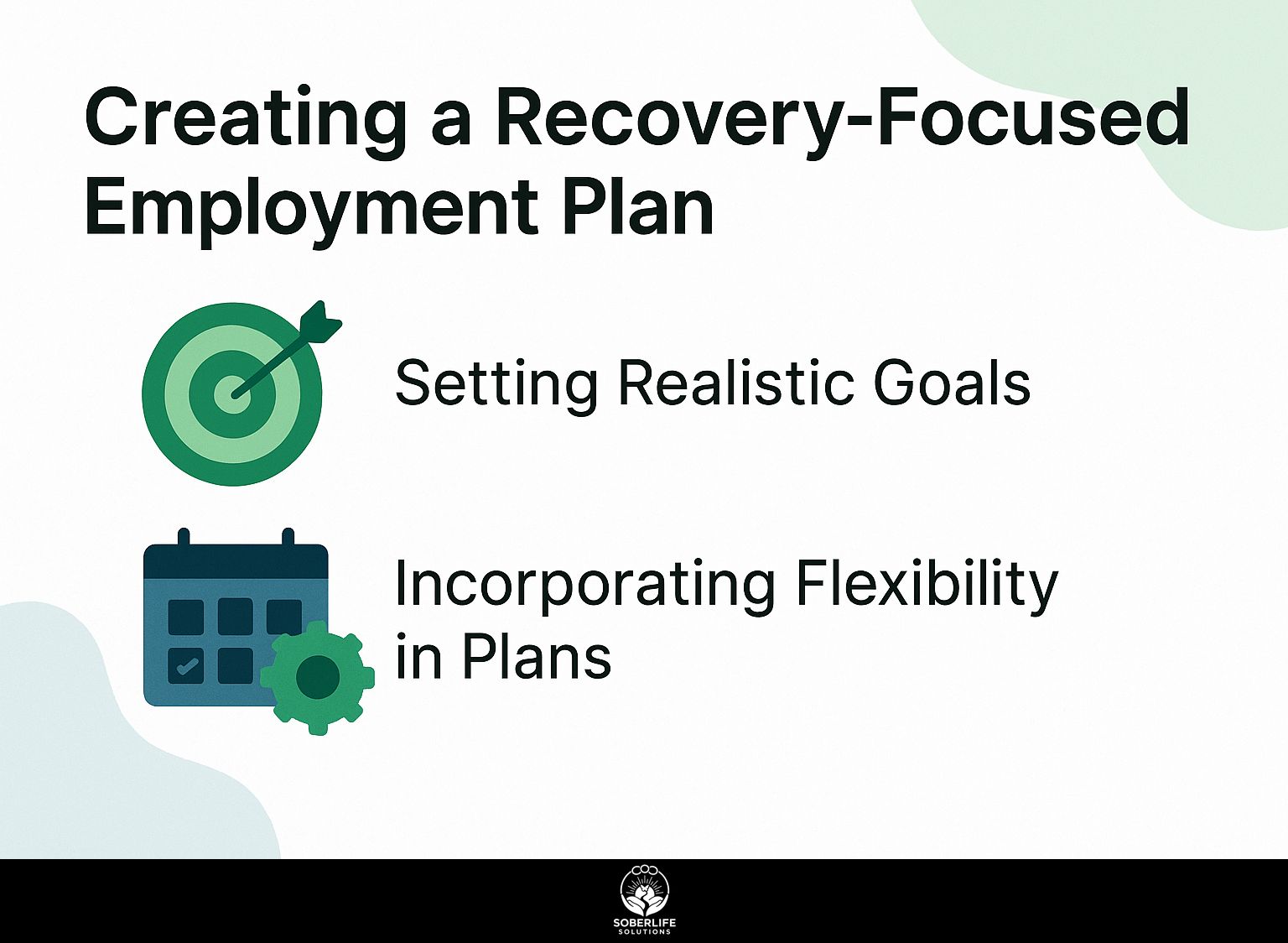
A clear employment plan focused on recovery helps people in recovery reach their job goals and improve themselves.
Setting Realistic Goals
Setting realistic goals is important for keeping yourself motivated and moving forward, particularly when looking for a satisfying job while recovering.
Make goals that are specific, measurable, achievable, relevant, and time-bound.
For example, plan to finish a job training course in six months, which gives you useful skills. Track your progress by maintaining a weekly journal. This could include reflections on completed assignments and skills gained.
Another effective method is to establish a networking goal, such as attending two industry-related events within the next three months.
These strategies offer a clear plan and increase your readiness and confidence when looking for a job.
Incorporating Flexibility in Plans
Adding flexibility to work plans helps people handle new challenges and opportunities, building emotional strength during recovery.
To build this flexibility, consider setting adjustable timelines for career goals. For example, instead of committing to a strict six-month timeline for job searches, extend it to a year with quarterly reviews to assess progress.
Use different training methods, like online courses from websites like Coursera or Udemy, which let you learn at your own speed.
Build a group of mentors and colleagues to exchange ideas, stay motivated, and remain flexible in changing job markets.
Resources for Job Training and Placement
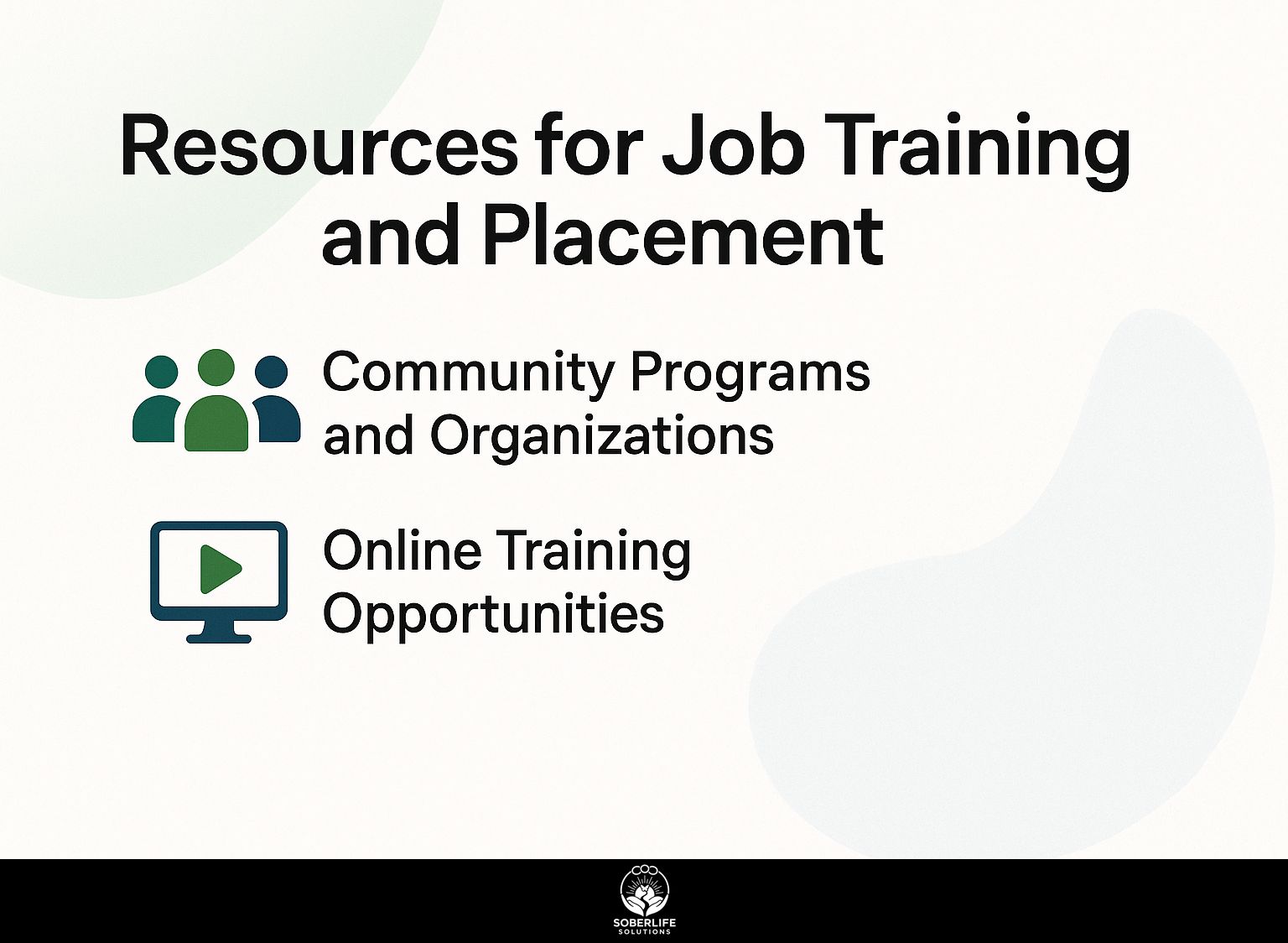
There are different resources for job training and placement, including community programs and online platforms that help people gain important skills for work.
Community Programs and Organizations
Community programs are important in providing job placement services and support for people recovering from substance use disorders.
Programs like the Salvation Army’s Employment Services offer job readiness training, resume workshops, and access to a network of employers willing to hire.
Similarly, the local Goodwill helps people find jobs and offers training programs.
For more individual help, the Phoenix House connects people with mentors through peer support networks. These mentors have gone through their own recovery and found jobs.
For contact information, visit their websites or call their local offices to learn about service availability in your area.
Online Training Opportunities
Online courses are becoming more available, offering flexible skill-building options for people in recovery who want to enter the job market.
Platforms like LinkedIn Learning and Udemy feature courses specifically designed to build job skills in fields such as digital marketing, computer programming, and project management.
To promote responsibility, create a daily study schedule with short sessions to make consistent progress. For example, allocate 30 minutes daily to complete lessons and set weekly goals to finish one course per month.
This structured method keeps you motivated and helps you gain important skills, which can greatly improve your job opportunities, making it easier to get back into the workforce.
Support Systems for Sustained Employment
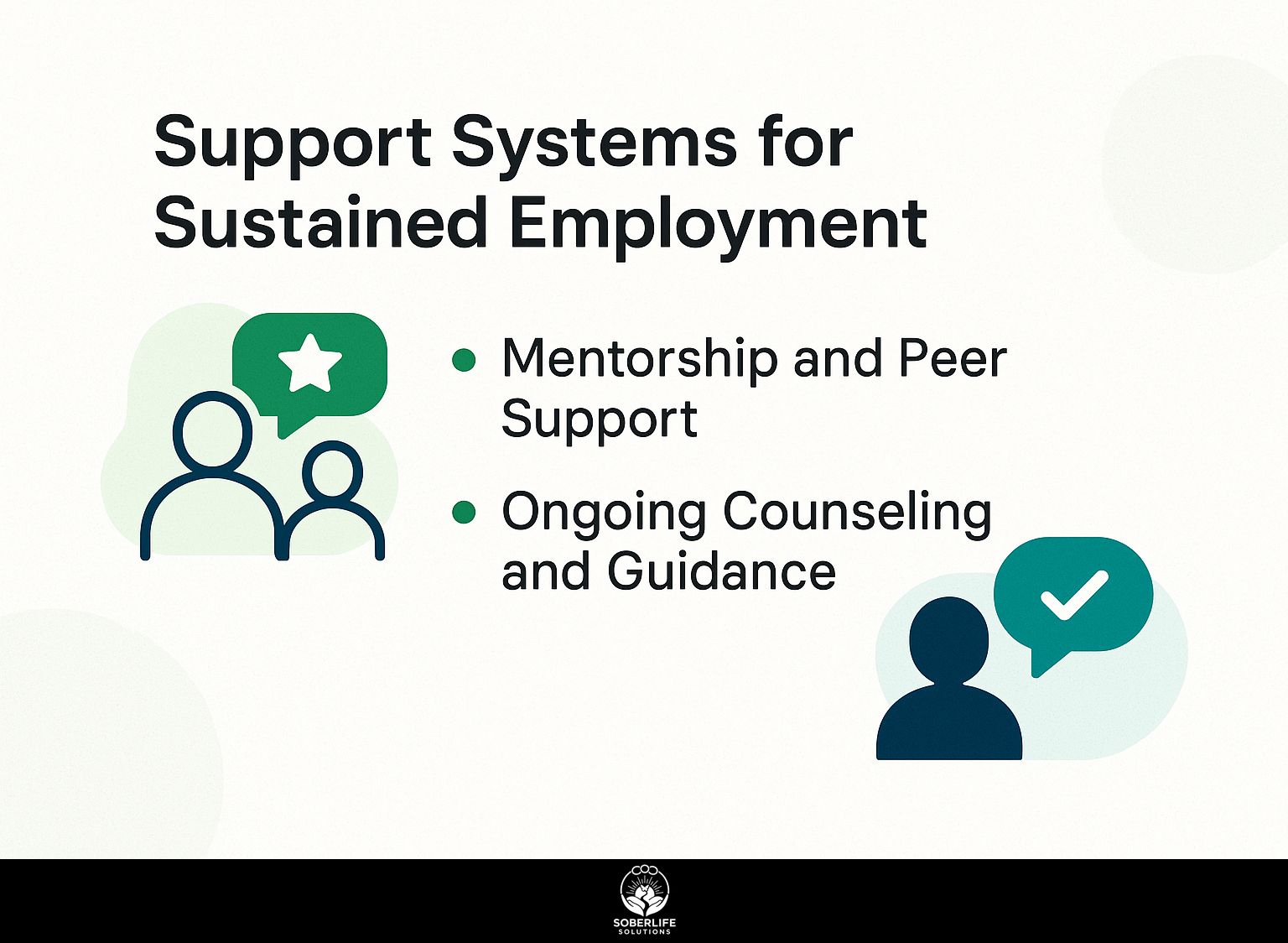
Building solid support networks is important for ongoing work and lasting recovery, helping people with the help needed to handle difficulties. Curious about the impact of social services on quality of life in recovery? Discover how social services can significantly aid in building these networks.
Mentorship and Peer Support
Mentorship and peer support are important tools that help individuals build social connections and gain confidence in how they look for jobs.
Programs like Oxford Houses exemplify effective mentorship by providing a community for individuals in recovery. People here help each other by sharing their experiences, which helps them heal emotionally and learn new skills.
Organizations such as SCORE offer mentorship for entrepreneurs, pairing new business owners with experienced professionals to guide them through challenges.
Joining peer groups or mentorship programs builds self-confidence and improves networking abilities, greatly increasing career opportunities.
Ongoing Counseling and Guidance
Regular counseling and advice offer continuous help for people as they deal with keeping jobs and recovering.
Meeting with career advisors regularly helps you stay focused and deal with new problems.
To find qualified support, consider resources like local referral programs, which often connect you with certified counselors. Community service organizations can help with career advice, so check out resources like 2-1-1 or your local workforce development center.
Using these resources helps you create a clear career plan and encourages responsibility in your recovery process.
Evaluating Success and Adjusting Plans
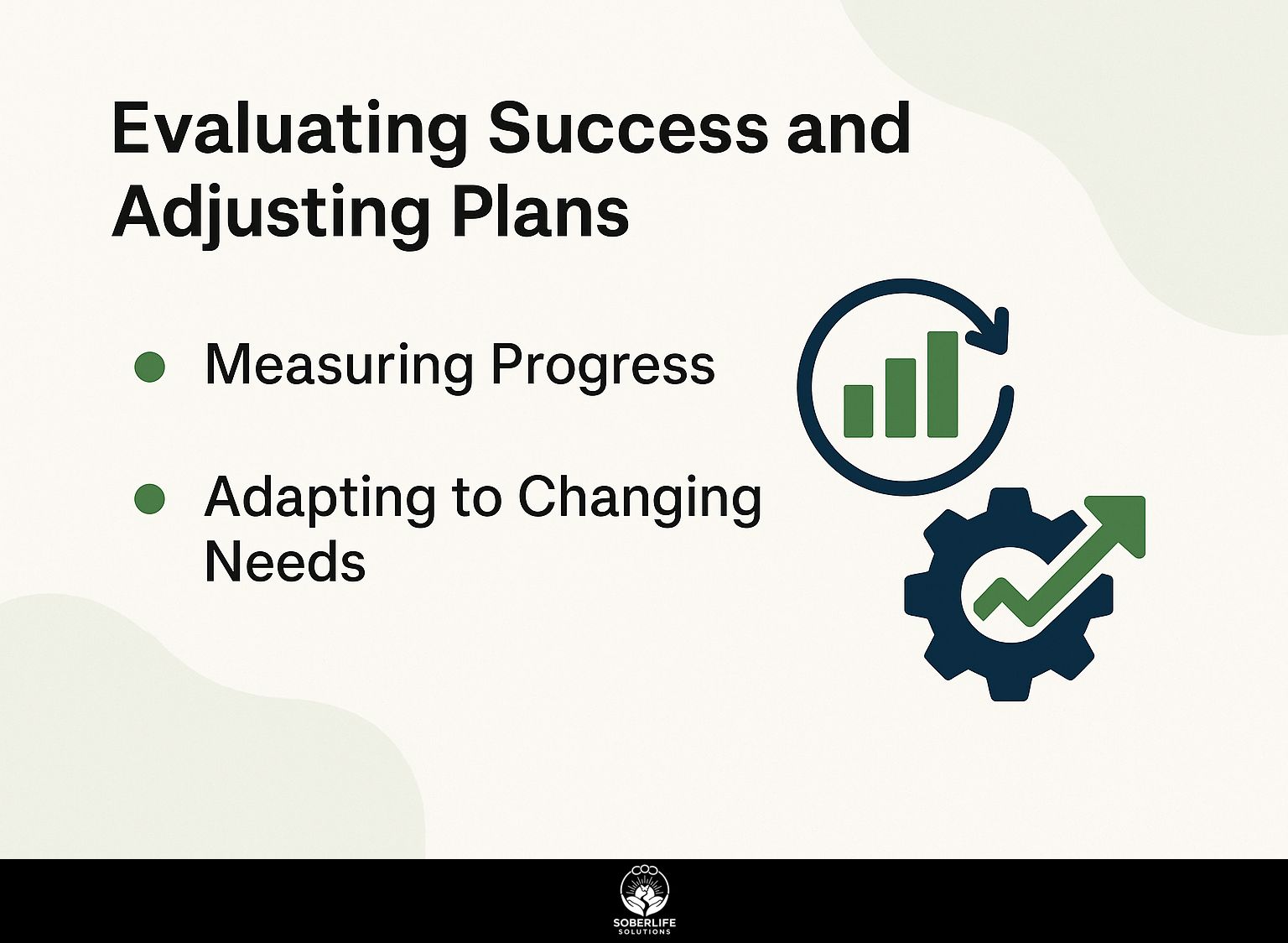
Checking how well you’re doing is important to adjust job plans so they align with your personal growth and recovery goals.
Measuring Progress
Measuring progress effectively allows individuals and support networks to track growth and identify areas needing adjustment in vocational goals.
To facilitate this, establish regular self-assessments, such as monthly reflection sessions, where individuals evaluate their achievements against set objectives.
Arrange meetings with mentors or colleagues every three months to get their opinions.
Utilizing tools like SWOT analysis (Strengths, Weaknesses, Opportunities, Threats) can clarify situational context.
For ongoing tracking, consider digital platforms like Trello for visual progress management or Google Sheets for customizable metrics.
This mix encourages responsibility and leads to real progress over time.
Adapting to Changing Needs
Adjusting to changing needs is important for maintaining recovery and keeping employment plans useful and up-to-date.
Incorporating feedback from individuals in recovery can be achieved through regular check-ins and assessments. Plan monthly meetings to review progress and collect feedback about job satisfaction and any difficulties encountered.
Tools like surveys or feedback forms can help facilitate this, enabling participants to express their thoughts anonymously if preferred.
Using community resources like support groups or job training services can improve the process. By building a team setting where people feel appreciated, you make sure that the career plans are customized and change with their needs.
Frequently Asked Questions
What are vocational needs in recovery?
Vocational needs refer to the employment and career-related goals and aspirations of an individual in recovery from addiction or mental health issues.
Why is addressing vocational needs important in recovery?
Addressing vocational needs helps individuals in recovery to gain a sense of purpose, structure, and financial stability, which can contribute to their overall well-being and prevent relapse.
What steps can I take to address my vocational needs in recovery?
Think about what you’re good at and what you like, set achievable goals, get job advice or training, and apply for jobs that match your skills.
How can vocational counseling help me in my recovery?
Vocational counseling can help you find your strengths and interests, look into various career choices, and offer support and guidance in setting and reaching your job goals.
What resources are available to help with job needs during recovery?
Yes, there are many resources available such as vocational rehabilitation programs, job training programs, and support groups for individuals in recovery looking for work.
What should I do if I am struggling with finding employment in my recovery?
If you are having trouble finding a job, it’s helpful to get advice and help from a career counselor or support group. You can look into options like volunteering or enrolling in additional courses to better your skills and improve your job prospects.

